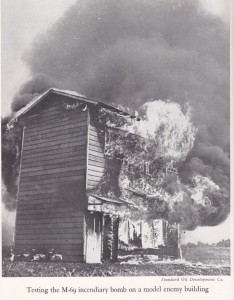I'm not sure what you are saying here.
If your point is that there is simply no such thing as a war crime (and that the trials of German and Japanese "war criminals" were nothing more than arbitrary demonstrations of vengeance against defeated foes), then we don't have a conversation.
If your point is that the only war criminals during the Second World War spoke only German or Japanese, then we don't have anything to talk about here either.
If your point is that the planned and protracted bombing campaign against Japanese cities was not a war crime based on insufficient evidence of intent on the part of the American military or because the violence administered by the Americans was not disproportionate, then I suppose we may have a discussion, although your position is increasingly untenable; there is simply no evidence in support of it.
The B-25Bs that launched from USS Hornet on 18 April 1942 did carry incendiary munitions: one weapon each, out of four total (the other three were general-purpose weapons of the 500 pound class, with a filler of high explosive). If you are able spin these details into a central, immovable policy directive telling Allied bomber forces what to do and how to do it for the remaining three years and four months of the war against Imperial Japan, I honor your rhetorical gifts.
A raid of sixteen B-25s dropping anything hardly constitutes military policy. I've only pointed out that the incendiaries were being used from the start (and not in response to unforeseen circumstances or events).
The "central, immovable policy directive" you describe was simply the run-up to the actual bombing raids. Forget about the comments anyone was making at the time; let's look at their actions.
I've already referred to the map of Tokyo that identified the neighborhoods by their inflammability.

In 1943, almost two years before the B-29 raids were launched from the Marianas, the USAAF constructed a German and Japanese village in the Utah Proving Ground for the purpose of testing incendiary bombs on (wait for it) houses. The US military was trying to determine the best way to...burn down peoples' homes. (What could possibly be the point of constructing a village in the desert for the purpose of bombing it with incendiaries if we didn't intend to bomb a village with incendiaries?)
It’s a mistake to quote senior leaders such as James H Doolittle and Curtis E LeMay, then pretend their off-the-cuff opinions and stray remarks defined policy for conducting every later operation in exhaustive detail. All these guys talked and wrote a very great deal and not every word carried equal force, nor significance.
I haven't quoted Dolittle. (For the sake of this discussion I'll concede that LeMay's comment about acknowledging his presence at a potential Japanese war crimes trial was an off-the-cuff remark.) If, instead of Dolittle, you were referring to General Marshall, then I would respectfully disagree that his was an off-the-cuff remark. He was speaking at a press conference, and he was providing specific details. He would have known about "JB-355" as well as the B-17s and their aircrews being deployed in Southeast Asia for the purpose of incendiary bombing (cities); these facts fit in perfectly with his comments.
Claire L Chennault should be afforded less weight in discussions like we’re having. Before the war he was a washed-up Air Corps Captain who had fallen out of favor with leadership for advocating pursuit aviation over long-range bombardment. He wasn’t taken seriously until he managed to accumulate some successes with his American Volunteer Group.
While I suppose an attack on an individual's character is reflexive for someone short of ammunition in a debate, the statement about any past shortcomings of his has nothing to do with his position at the time. More importantly, his position at the time was sufficient to have the ear of President Roosevelt. Most importantly, his position at the time was such that his request had not only been heard by the President, it had been granted by him as well.
If you find pre-war assertions about torching Japan’s Home Islands ominous in light of later air strikes...
I don't find anything about it ominous. I've only responded to the revisionist, who takes the position that the targeting of Japanese population centers was either unintended or forced by events that could not have been foreseen during the planning stages of the Army Air Force's bombing campaign against Japan. My point has been consistent throughout this thread; the Japanese population centers were always considered legitimate targets of the bombing campaign and that any discussion about the morality of dropping the atomic bombs is nothing more than a distraction.
If you’ve been hoping I will genuflect to your righteousness, I have to disappoint you. Your authority isn’t earned by any honest effort in the real world. But you issue diktats to the rest of us as if you were a potentate; when challenged, you hide behind the skirts of an “Authority” that only supports what you say and works your will: an intellectually dishonest way to sneak in through the back door and exercise power without legitimacy. A gambit all too human.
Congratulating yourself on your “objectivity” in this is a non-starter: makes your credibility smaller, not greater. In a word, untrustworthy. You’ve been enjoying a life of lotus-eating ease courtesy of people who actually went to war in the 1930s and 1940s, enduring sacrifices untold for our sakes.
Either concede my point or else present evidence to support a counterpoint. If you can't do either, then just walk away. All you have left is the ad hominem attack, which is unbecoming in a forum that promotes the free exchange of ideas. (It's also a pretty good indicator that the discussion is over.)


